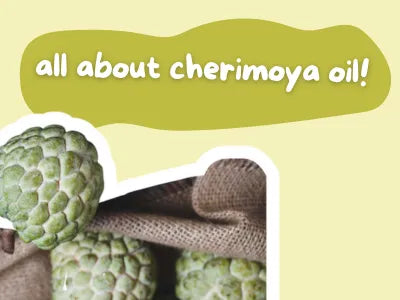
Cherimoya : Uses, Benefits & Side Effects
Share
Cherimoya: The Tropical “Custard Apple” Packed with Health Benefits
Cherimoya (scientific name: Annona cherimola), often called the "custard apple," is a luscious tropical fruit celebrated for its creamy, sweet pulp and delightful flavor. Beyond taste, cherimoya is packed with nutrients, including Vitamin C, antioxidants, and dietary fiber, making it a powerhouse for overall health and skin vitality.
The fruit’s creamy texture and sweet flavor—reminiscent of banana, pineapple, and strawberry—make it a refreshing treat, while its nutrient profile supports immune health, digestion, and skin wellness. Rich in antioxidants, cherimoya combats free radicals, promotes collagen production, and helps maintain skin elasticity, reducing fine lines and signs of premature aging.
Cherimoya’s benefits extend beyond consumption. Its extracts are used in skincare and haircare products to hydrate, rejuvenate, and protect, making it a versatile ingredient in children’s wellness routines. Explore our range of kids’ skincare and haircare products to complement a healthy diet with external care.
Cherimoya Uses & Benefits
Cherimoya is not just a delicious fruit but also a nutritional powerhouse:
- Rich in Nutrients: Contains Vitamin C, B vitamins, potassium, and magnesium.
- Supports Digestive Health: High dietary fiber aids digestion and prevents constipation.
- Boosts Skin Health: Vitamin C supports collagen synthesis, improving skin elasticity and hydration.
- Heart Health: Potassium contributes to maintaining healthy blood pressure levels.
- Antioxidant Properties: Helps fight free radicals, supporting overall cellular health.
Culinary Uses
- Eat fresh: Scoop the creamy flesh for a refreshing snack.
- Smoothies & desserts: Blend into smoothies, fruit salads, sorbets, or creamy desserts.
- Savory dishes: Dice and add to salads or salsas for a tropical twist.
Recommended Usage
- Moderation is Key: Due to natural sugars, enjoy cherimoya in balanced portions.
- Seed Avoidance: Do not consume seeds—they contain compounds that may be toxic in large amounts.
- Ripeness Matters: Choose fully ripe fruits that yield slightly to gentle pressure.
Side Effects & Precautions
- Seeds: Contain acetogenins and small amounts of toxic compounds; avoid ingestion.
- Allergies: If allergic to bananas or pineapples, test a small portion first.
- Overconsumption: Excess sugar intake can affect blood sugar levels.
- Skin Contact: Peel carefully to avoid irritation from the outer skin.
Store in a cool, dry place or refrigerate to maintain freshness, and always wash before consumption.
FAQs on Cherimoya
-
What is Cherimoya?
A tropical fruit known for its creamy pulp and sweet taste, scientifically Annona cherimola. -
Benefits for Skin?
Supports collagen production, skin elasticity, and hydration. -
Nutritional Value?
High in Vitamin C, B vitamins, potassium, and fiber. -
Consumption Tips?
Eat fresh, add to smoothies, or mix into desserts and salads. -
Any Side Effects?
Avoid seeds; consume flesh in moderation.
Incorporating cherimoya into your child’s diet is a tasty way to support overall health, immunity, and skin wellness. Pairing a nutrient-rich diet with gentle external care can amplify benefits! Buy Tuco once, trust us forever!

